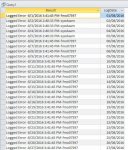lookforsmt
Registered User.
- Local time
- Today, 20:23
- Joined
- Dec 26, 2011
- Messages
- 672
HI!
I have db with table which has text as mentioned below. I am not able to separate the date from the text which has other characters.
I have done with partial success for months with single digit(1 to 9) but when it is two digit (10 to 12) the query does not give me the desired result.
can anyone help me to get the result I want.
Logged Error -8/1/2016 3:41:45 PM-fmo07397
Logged Error -8/9/2016 3:41:45 PM-fmo07397
Logged Error -8/10/2016 3:41:45 PM-fmo07397
Logged Error -8/11/2016 3:41:45 PM-fmo07397
Logged Error -8/19/2016 3:41:45 PM-fmo07397
Logged Error -8/20/2016 3:41:45 PM-fmo07397
Logged Error -8/30/2016 3:41:45 PM-fmo07397
Logged Error -8/31/2016 3:41:45 PM-fmo07397
Logged Error -10/1/2016 3:41:45 PM-fmo07397
Logged Error -10/9/2016 3:41:45 PM-fmo07397
Logged Error -10/10/2016 3:41:45 PM-fmo07397
Logged Error -10/19/2016 3:41:45 PM-fmo07397
Logged Error -10/20/2016 3:41:45 PM-fmo07397
Logged Error -10/30/2016 3:41:45 PM-fmo07397
Logged Error -10/31/2016 3:41:45 PM-fmo07397
Expected result
01/08/2016
31/10/2016
many thanks
I have db with table which has text as mentioned below. I am not able to separate the date from the text which has other characters.
I have done with partial success for months with single digit(1 to 9) but when it is two digit (10 to 12) the query does not give me the desired result.
can anyone help me to get the result I want.
Logged Error -8/1/2016 3:41:45 PM-fmo07397
Logged Error -8/9/2016 3:41:45 PM-fmo07397
Logged Error -8/10/2016 3:41:45 PM-fmo07397
Logged Error -8/11/2016 3:41:45 PM-fmo07397
Logged Error -8/19/2016 3:41:45 PM-fmo07397
Logged Error -8/20/2016 3:41:45 PM-fmo07397
Logged Error -8/30/2016 3:41:45 PM-fmo07397
Logged Error -8/31/2016 3:41:45 PM-fmo07397
Logged Error -10/1/2016 3:41:45 PM-fmo07397
Logged Error -10/9/2016 3:41:45 PM-fmo07397
Logged Error -10/10/2016 3:41:45 PM-fmo07397
Logged Error -10/19/2016 3:41:45 PM-fmo07397
Logged Error -10/20/2016 3:41:45 PM-fmo07397
Logged Error -10/30/2016 3:41:45 PM-fmo07397
Logged Error -10/31/2016 3:41:45 PM-fmo07397
Expected result
01/08/2016
31/10/2016
many thanks




